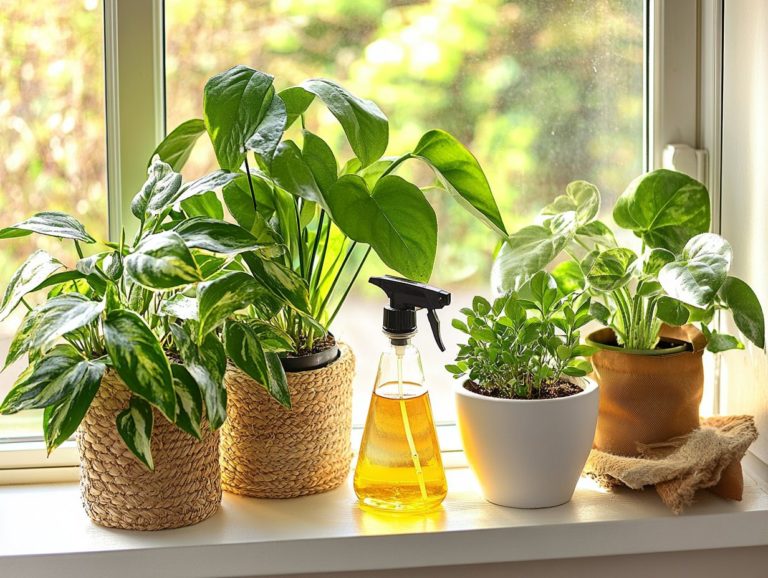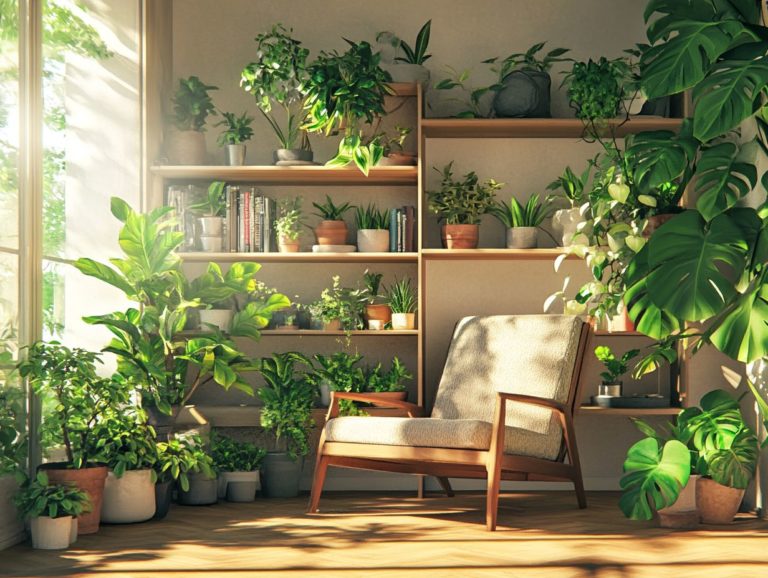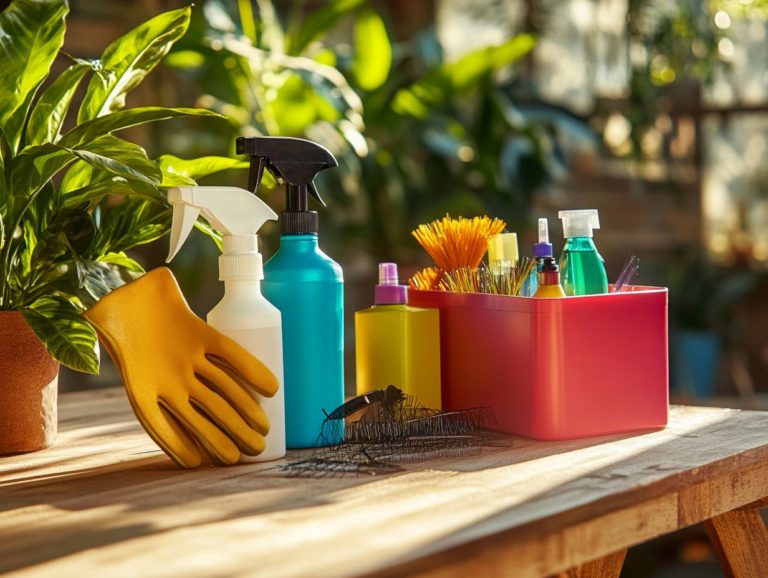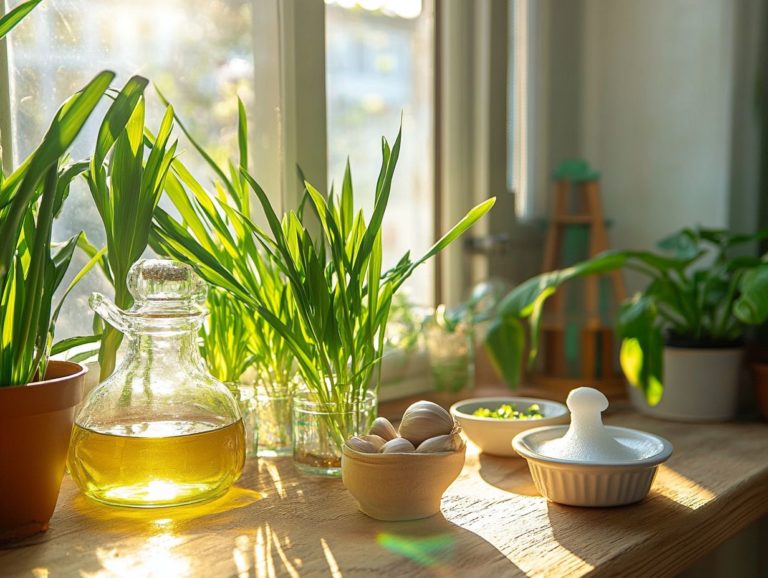Top 5 Pest Control Products for Houseplants
Keeping your houseplants in top shape often involves tackling a few pesky pests that threaten their vitality, including spider mites and aphids.
From aphids to spider mites, these unwelcome intruders can create chaos in your cherished greenery. The good news is that there are effective, natural solutions to address these infestations without the need for harsh chemicals, including homemade pesticides made from simple ingredients like diluted dish soap and vegetable oil.
Let s explore the top five pest control products such as Bonide Captain Jacks Neem Oil and Garden Safe Diatomaceous Earth that can safeguard your plants. We ll delve into their effectiveness, safety for your plants, and other natural methods to keep your indoor garden flourishing.
Don t wait! Reclaim your plant paradise today! Let s dive in and explore the best organic methods for keeping pests at bay!
Contents
- Key Takeaways:
- 1. Neem Oil
- 2. Diatomaceous Earth
- 3. Sticky Traps
- 4. Insecticidal Soap
- 5. Essential Oils
- How Do These Products Help with Pest Control?
- Frequently Asked Questions
- What are the top 5 pest control products for houseplants?
- How does neem oil work as a pest control product for houseplants?
- What is insecticidal soap and how does it help control pests on houseplants?
- Can diatomaceous earth be used as a pest control product for indoor houseplants?
- What are sticky traps and how do they help with pest control for houseplants?
- Are essential oils effective for pest control on houseplants?
Key Takeaways:
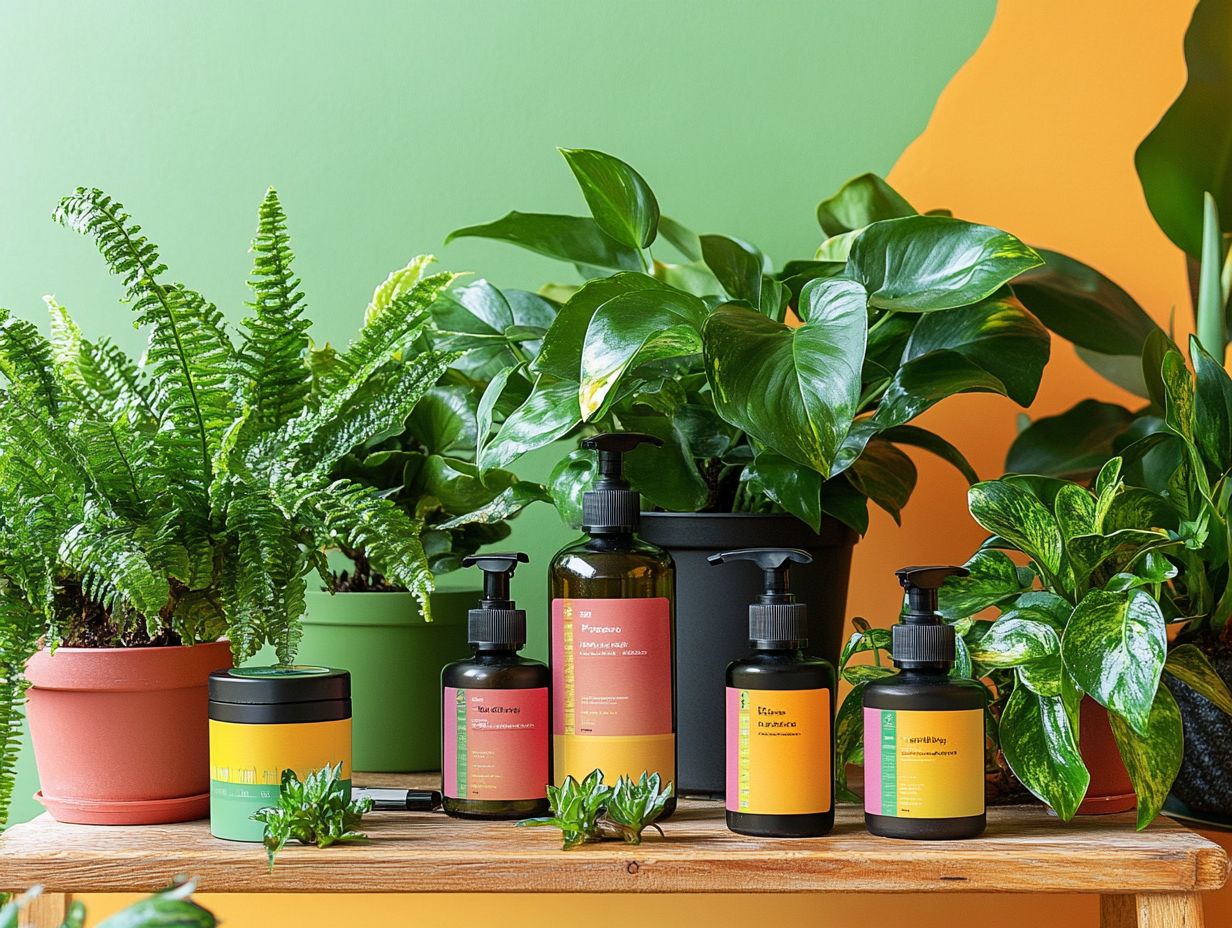
- Neem Oil is a natural and effective pest control product for houseplants, with antibacterial and antifungal properties to eliminate pests like aphids and whiteflies.
- Diatomaceous Earth is a safe and non-toxic option to control pests on houseplants, particularly for soil-dwelling insects like thrips and fungus gnats, making it one of the best all-purpose solutions for pest management.
- Sticky Traps are a simple but effective way to capture flying insects like fruit flies and gnats, preventing them from laying eggs on houseplants.
1. Neem Oil
Neem oil, extracted from the seeds of the neem tree, stands out as one of the best natural pest control solutions for your houseplants. Its power lies in its ability to disrupt the life cycles of pesky invaders like aphids, spider mites, and mealybugs, all while keeping beneficial insects and the environment safe.
With its antifungal and antibacterial properties, neem oil seamlessly integrates into your DIY insecticides routine, earning the affection of organic gardeners and houseplant aficionados alike. Natria Insecticidal Soap is also a solid choice for pest issues.
For the best results, mix a few drops of neem oil with water and a gentle soap in a spray bottle. Shake well to emulsify the concoction.
Apply the mixture thoroughly. Cover both the top and underside of the leaves to fully harness its protective benefits. Regular applications, especially during the growing season, will provide ongoing defense and promote robust, vibrant plant growth. Try neem oil today and watch your plants thrive!
2. Diatomaceous Earth
Diatomaceous earth (DE) stands out as a remarkably effective natural pesticide derived from fossilized algae, often hailed as one of the best all-purpose solutions for pest control in both indoor plants and gardens. Its ultra-fine, powdery texture serves as a drying agent, dehydrating pests upon contact, which makes it particularly effective against soft-bodied insects such as aphids and fungus gnats. You can rest easy knowing that DE is safe for use around both pets and humans, making it an excellent choice for those who lean toward organic pest management options.
Beyond its impressive effectiveness, diatomaceous earth offers a variety of application methods; you can sprinkle it directly onto plants or soil, utilize dusters for pinpoint targeting, or even mix it into potting soil for ongoing protection.
If you re using this remarkable substance indoors, remember to ensure proper ventilation during application to avoid inhaling those fine particles. Keeping DE away from food preparation areas enhances safety even further.
When applied correctly, diatomaceous earth not only tackles existing infestations but also serves as a proactive measure, safeguarding your plants against future pest incursions, making it a staple for DIY insecticides.
In conclusion, using natural pest control methods like neem oil and diatomaceous earth can help you maintain a healthy indoor garden. Embrace these solutions and enjoy flourishing plants free from harmful pests!
3. Sticky Traps
Sticky traps, such as the well-known Mosqueda Sticky Traps, offer you an efficient, chemical-free solution for monitoring and managing pest populations on your indoor plants. These vibrant yellow or blue adhesive sheets are designed to attract flying insects like whiteflies and fungus gnats, effectively capturing them before they wreak havoc on your beloved greenery.
Not only do they aid in pest identification, but they also play a vital role in reducing pest numbers without resorting to toxic chemicals. This makes them an essential addition to your houseplant care toolkit!
When utilized properly, these traps can significantly diminish pest populations over time, helping you maintain a thriving indoor garden. To get the most out of them, placement is crucial; position your traps near the soil of pots or close to the foliage where these pests tend to congregate. Make sure to replace them regularly for the best results!
Strategically positioning traps in various locations allows you to detect infestations early and keep those pesky intruders at bay, transforming your indoor gardening experience into a more enjoyable and successful endeavor.
4. Insecticidal Soap
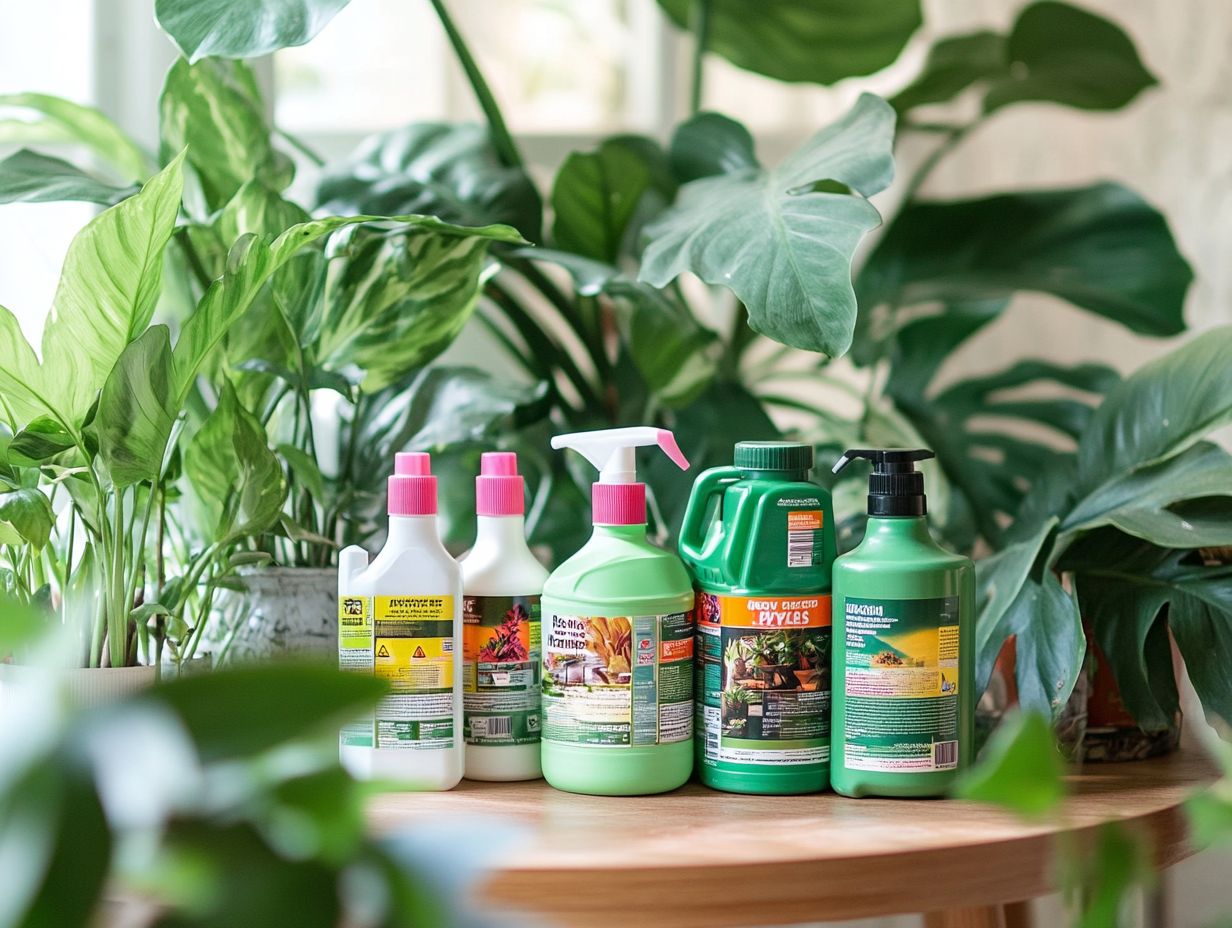
Insecticidal soap, like Natria Insecticidal Soap, emerges as a premier organic solution for tackling the pests that pose a threat to your cherished houseplants. This effective pesticide suffocates soft-bodied insects such as aphids and mealybugs, offering a safe and environmentally friendly alternative to chemical pest control methods.
You can easily make your own insecticidal soap at home with just a few simple ingredients like dish soap and water. This makes it an accessible option for any gardener intent on protecting their indoor oasis.
To create an effective homemade solution, mix about one to two tablespoons of liquid soap in a quart of water. Just be sure to select a soap devoid of additives and fragrances, as these can harm your plants. When applying your concoction, cover both the tops and undersides of the leaves. Pests often hide in those hard-to-see spots, so thoroughness is key.
Always conduct a patch test on a discreet section of the plant before going all in, just to ensure there are no adverse reactions.
Timing is everything; aim to apply it in the early morning or late evening to reduce the risk of leaf burn from direct sunlight. Your plants will thank you for the extra care!
5. Essential Oils
Essential oils, like peppermint essential oil, garlic and chilli, and tea tree oil, are gaining recognition for their remarkable pest control properties in both gardening and houseplant care. These natural repellents not only keep a variety of pests at bay but also infuse your space with a delightful aroma, enhancing your indoor environment.
Their effectiveness stems from their ability to disrupt the sensory receptors of insects, making them a perfect fit for a natural way to control pests that every home gardener should embrace.
Take tea tree oil, for example. It s well-regarded for tackling mold and repelling pests such as mites and ants. Meanwhile, lavender oil works wonders against mosquitoes and moths with its calming scent.
To harness these oils effectively, simply mix a few drops with water in a spray bottle, giving it a good shake before application. Consider using a mixture that includes hydrogen peroxide for an extra boost in pest control. Regularly applying this mixture around windows, doors, and at-risk plants can create a formidable barrier against unwanted pests, fostering a healthier indoor gardening experience.
Don t wait! Start using essential oils today to protect your plants!
How Do These Products Help with Pest Control?
Understanding the effectiveness of products like BioAdvanced Organics Houseplant Insect Killer, Natria Insecticidal Soap, and Bonide Captain Jacks Neem Oil can help you create a robust pest management strategy.
Products like neem oil, diatomaceous earth, insecticidal soap, and essential oils, such as peppermint and garlic, provide powerful tools for pest control, offering natural and safe alternatives to chemical pesticides.
Each product has its unique way of working: neem oil interferes with the breeding of pests, diatomaceous earth has a drying effect on insects, insecticidal soaps suffocate soft-bodied bugs, and essential oils repel various pests through their potent aromas.
By understanding how these products work, you can craft a comprehensive pest management strategy that prioritizes the health of your houseplants and the environment.
If you face a swarm of aphids or spider mites, combining insecticidal soap and neem oil can effectively handle the issue, as both target those pesky soft-bodied insects but work in different ways.
For crawling nuisances like ants or cockroaches, diatomaceous earth stands out with its drying effect. It s essential to consider the specific pest you re dealing with, such as mealybugs or whiteflies, and their life cycle stages to select the most effective product. This ensures you tackle the problem efficiently while maintaining ecological balance.
What Types of Pests Can These Products Eliminate?
The natural pest control products at your disposal, like neem oil and diatomaceous earth, are quite effective against a range of pests, including spider mites, aphids, and fungus gnats, among others. Each product has its unique method of action: neem oil interferes with the breeding of aphids and spider mites, while diatomaceous earth works by dehydrating soft-bodied pests such as fungus gnats.
Recognizing early signs of infestations like tiny webs, which can indicate spider mites, leaf discoloration, a common symptom of pests like aphids and whiteflies, or unusual soil activity allows you to intervene promptly. Check your plants often to catch problems early!
You can also use beneficial insects, like ladybugs, to control pest populations. For example, introducing ladybugs can work alongside neem oil in managing aphid populations. Similarly, using sticky traps, such as Mosqueda Sticky Traps, can effectively capture adult fungus gnats in tandem with diatomaceous earth, creating a synergistic approach to maintaining a healthy indoor environment.
Accurate identification of these common pests gives you the power to select appropriate treatments and adopt preventive measures with greater efficacy.
How to Properly Use These Products for Maximum Effectiveness?
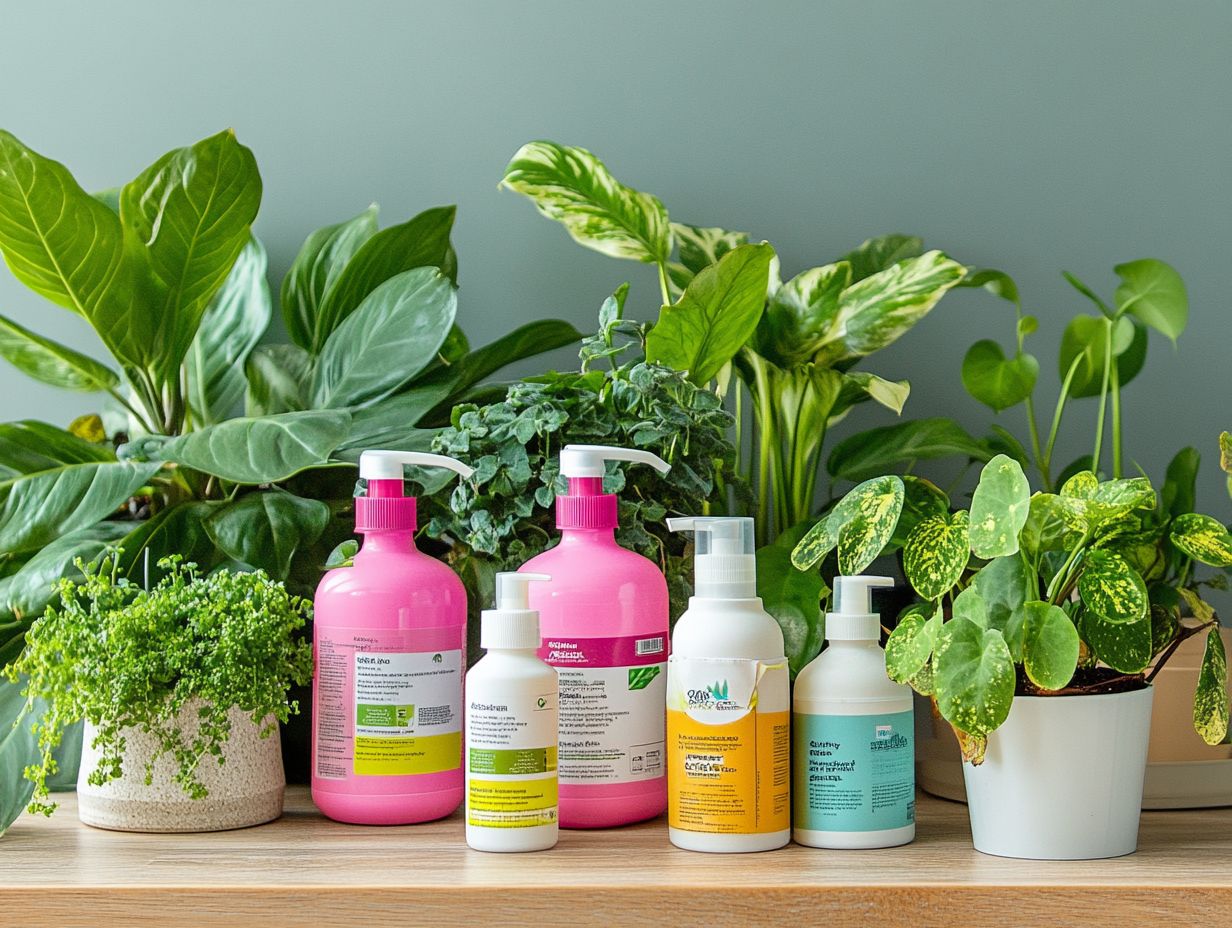
To get the best results from these products, know how to use them effectively! It s essential to grasp the proper use of products like Natria Insecticidal Soap, Bonide Captain Jacks Neem Oil, and BioAdvanced Organics Houseplant Insect Killer, along with diatomaceous earth and neem oil.
Mastering the correct application techniques and understanding the optimal timing and frequency for applying neem oil or other DIY insecticides is crucial for effective pest management. For example, apply insecticidal soap in the early morning or late evening to protect beneficial insects while effectively targeting pests.
Diatomaceous earth requires reapplication after rain or whenever pests like spider mites become active. Typically, you should reapply it every few weeks. Neem oil, celebrated for its versatility, should be applied every 7 to 14 days during an active infestation. Make sure to cover all areas of the affected plant thoroughly, as pests are adept at hiding.
Never underestimate the importance of reapplication, especially after heavy rain or strong winds. This is crucial for maintaining your pest control measures and promoting the health of your plants.
Are These Products Safe for Houseplants?
One of the primary benefits of using products like neem oil, diatomaceous earth, and insecticidal soap is their safety for your houseplants and the environment. These organic pest control solutions minimize harm to beneficial insects while effectively managing pest populations. This makes them ideal for your indoor gardening endeavors.
When you use these products according to the instructions, you can keep your houseplants healthy and vibrant while protecting them from pests.
It s essential to consider the sensitivity of specific houseplants, including succulents. Some may react adversely to treatments like Castile Soap. For instance, succulents can be sensitive to an over-saturation of neem oil, while certain ferns might show signs of distress with insecticidal soap. Testing a small area of the plant first can help avoid adverse reactions to treatments like hydrogen peroxide or vegetable oil.
By taking this precaution, you can confidently monitor any reactions and adjust your pest control strategies accordingly. This ensures a safe and nurturing environment for all your beloved houseplants.
What Are Some Other Natural Pest Control Methods for Houseplants?
In addition to neem oil and insecticidal soap, you have a wealth of natural pest control methods at your disposal to effectively protect your houseplants. Consider homemade pesticides made from ingredients like garlic, chili, and cinnamon to create powerful deterrents. The use of essential oils, such as peppermint and rosemary, can also enhance your pest control efforts.
These methods utilize ingredients that you likely already have in your kitchen, enabling you to craft your own eco-friendly and efficient pest deterrents. By combining these techniques, you can strengthen your pest management strategy, ensuring a vibrant and healthy indoor environment.
Creating a simple garlic spray is easy:
- Blend two cloves of garlic with one cup of water.
- Strain the mixture.
- Dilute it further for a powerful insect repellent.
Similarly, a hot pepper solution keeps unwanted insects at bay. Just mix a tablespoon of crushed red pepper with a quart of water, let it steep, and strain it before applying it to your plants. A mild soap solution made from dish soap and water also serves as an effective insecticide, suffocating pests without harming your precious greenery. Each of these recipes leverages common kitchen items, making it effortless for anyone to cultivate a pest-free atmosphere.
When Should a Professional Pest Control Service Be Considered for Houseplants?
While natural pest control methods can be effective, there are times when getting help from a professional pest control service becomes essential for your houseplants, especially when infestations spiral out of control. Factors like the type of pests you’re dealing with, such as mealybugs and spider mites, can influence your choice of treatment. The extent of the infestation may require stronger solutions, like diatomaceous earth or professional-grade treatments. Additionally, the overall health of your plants should guide your pest management strategy.
Professional services offer targeted solutions from experts to address specific issues caused by pests, ultimately safeguarding your indoor garden.
If you find that persistent infestations continue despite your best efforts, or if you notice significant damage to your plants, these are clear signs that professional intervention is needed. Licensed experts provide advanced techniques that often include integrated pest management strategies and treatments that remain inaccessible to the average homeowner. This approach tackles not just the visible symptoms but also the underlying causes of infestations.
By blending your DIY strategies with professional pest management, you can establish a formidable defense against unwelcome pests. This ensures your plants thrive when provided with the right care and protection, allowing your indoor environment to flourish with the help of products like Natria Insecticidal Soap and Garden Safe Diatomaceous Earth.
Frequently Asked Questions
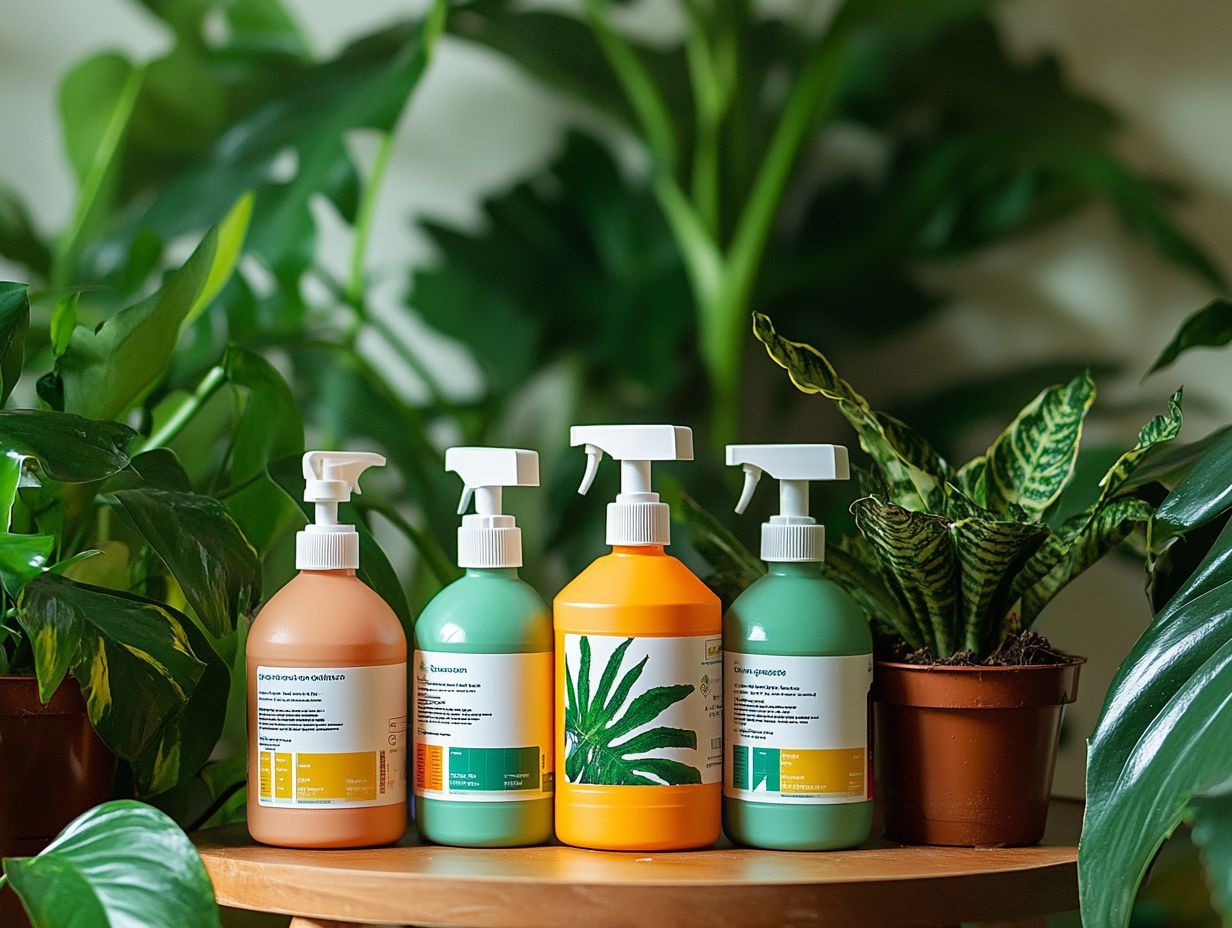
What are the top 5 pest control products for houseplants?
Want to keep your houseplants healthy? Here are the top five pest control products: neem oil, insecticidal soap, diatomaceous earth, sticky traps, and essential oils.
How does neem oil work as a pest control product for houseplants?
Neem oil interrupts how pests live and reproduce. It also suffocates and repels common houseplant pests.
What is insecticidal soap and how does it help control pests on houseplants?
Insecticidal soap is a safe, plant-based solution. It breaks down pests’ protective coatings, leading them to dehydrate and die.
Can diatomaceous earth be used as a pest control product for indoor houseplants?
Diatomaceous earth can effectively control pests in indoor plants. It damages the exoskeletons of insects, causing them to dry out.
What are sticky traps and how do they help with pest control for houseplants?
Sticky traps are adhesive sheets that attract flying insects. They provide a simple and non-toxic way to manage pest populations.
Are essential oils effective for pest control on houseplants?
Yes! Essential oils like peppermint and rosemary repel pests naturally. Don’t wait! They are safe for children and pets, making them a great choice!

